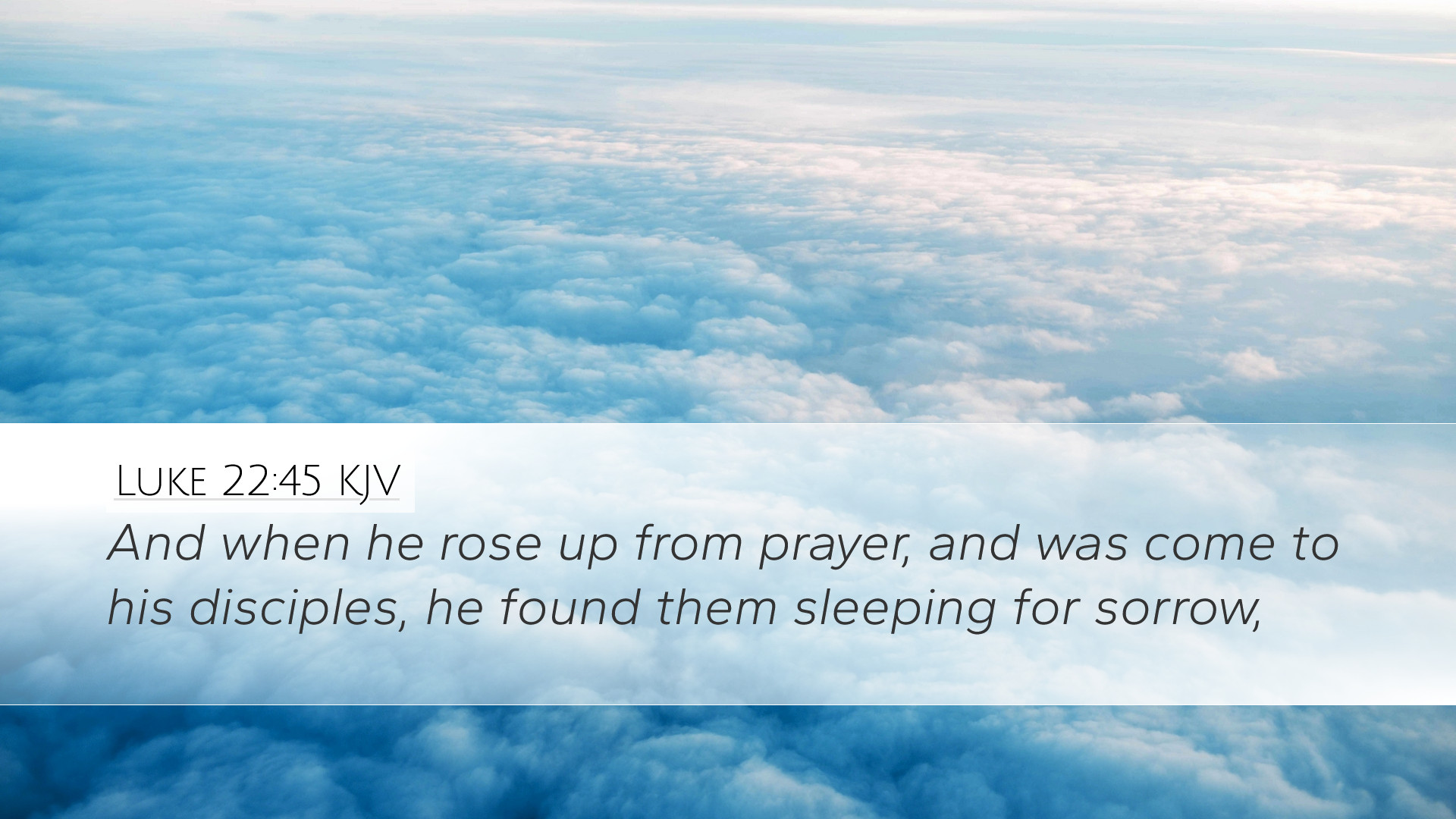Luke 22:45 Commentary
Verse Context: In Luke 22:45, we find a pivotal moment in the Gospels, illustrating the intense emotional and spiritual struggle of Jesus in the Garden of Gethsemane before His crucifixion.
Verse Text
"And when he rose up from prayer, and was come to his disciples, he found them sleeping for sorrow." (Luke 22:45)
Overview of the Context
This verse occurs during the final hours of Jesus' earthly ministry, placing it within a broader narrative of betrayal, trial, and impending sacrifice. The agony of Gethsemane is crucial for understanding the depth of Christ's suffering, both physical and spiritual. This prayerful moment demonstrates the humanity of Christ as He faces the weight of sin and separation from the Father.
Insights from Commentators
Matthew Henry
Henry emphasizes the significance of Jesus’ withdrawal to pray as a demonstration of His reliance on the Father amidst overwhelming distress. He notes that Jesus “rose up from prayer” not only to encourage His disciples but also to face the impending darkness that lay before Him. The disciples' sleep symbolizes their inability to grasp the gravity of the situation—reflecting both physical exhaustion and spiritual slumber.
Key Observations
- Human Weakness: Henry points out that the disciples' sleeping reveals human frailty in the face of deep spiritual warfare.
- The Importance of Vigilance: Jesus’ call to stay awake urges believers to remain vigilant in prayer, particularly in times of temptation and trial.
Albert Barnes
Barnes highlights the emotional state of Jesus juxtaposed against the disciples. He explains that their sleep was a consequence of “sorrow,” indicating an emotional heaviness they felt due to the scenario unfolding around them. Barnes remarks on the profound solitude of Jesus as He prayed, providing a graphic illustration of His loneliness in service to His mission.
Key Insights
- Loneliness in Ministry: The passage serves as a reminder of the solitude that often accompanies faithful service.
- Nature of Spiritual Sorrow: Barnes notes that sorrow can lead to despair and inattentiveness, emphasizing the need for spiritual alertness.
Adam Clarke
Clarke delves into the theological implications of Jesus' need for prayer. He asserts that prayer served as a source of strength for Jesus, consequently highlighting the necessity for all believers to engage in prayerful dependence on God. Clarke also points out the psychological dimensions of Jesus’ torment—precisely what He was about to endure on the Cross.
Reflections on Prayer
- Prayer as a Strengthening Force: Clarke emphasizes that despite His divine nature, Jesus exemplified the practice of prayer to gain fortitude.
- Understanding Suffering: The verse invites deeper contemplation regarding the nature of suffering and its place within the divine plan.
Theological Implications
The verse encapsulates the duality of Christ’s nature—fully divine yet fully human. His experience in Gethsemane affords profound insight into the nature of grief, sorrow, and spiritual battle. Believers are encouraged to reflect upon Christ's prayer, understanding that it models the importance of seeking God in times of distress.
Applications for Today
- Vigilance in Prayer: The call to overcome spiritual lethargy resonates with contemporary Christians, urging them to stay spiritually alert.
- Empathy for Human Struggles: Pastors and leaders can identify with this verse, resonating with the emotional and physical toll of ministry.
- Understanding the Human Experience of Christ: This passage encourages deeper theological reflection on the humanity of Jesus and His relational connection with the Father.
Conclusion
Luke 22:45 serves as a profound reminder of both the depth of Jesus' suffering and the necessity for prayer in our lives. As we contemplate this moment in the Gethsemane, may we be inspired to engage deeply in prayer and maintain vigilance in our spiritual walk, mimicking Christ who faced unimaginable trials with unwavering faith and steadfast dependence on God.


